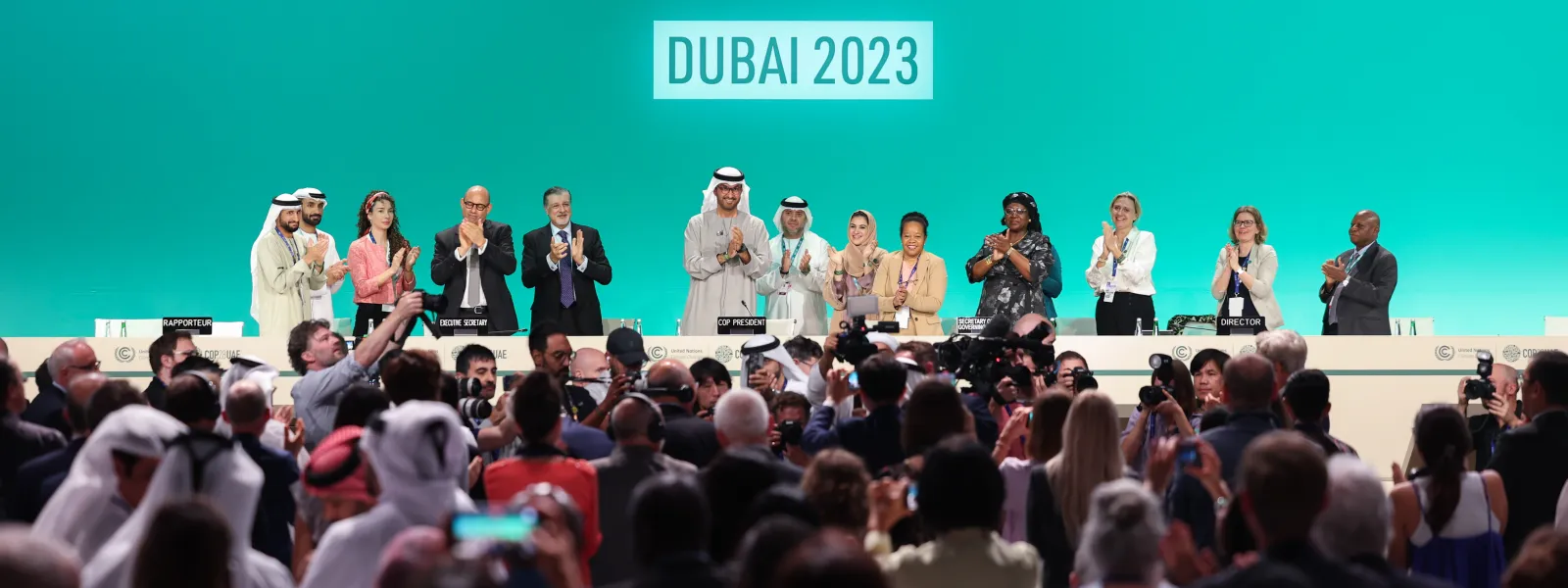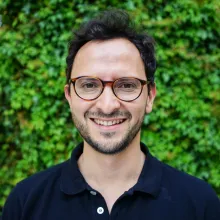
After COP28 in Dubai: The complex road to Baku and Belém
Photo: COP28/Christopher Pike (CC BY-NC-SA 2.0 DEED).By Javier Dávalos, Claudia Velarde and Marcella Ribeiro*
The twenty-eighth United Nations Climate Change Conference (COP28), held in Dubai, United Arab Emirates, was the largest ever in terms of the number of participants. The representatives of the States Parties to the United Nations Framework Convention on Climate Change and the Paris Agreement held intense discussions under the scrutiny of stakeholders from various sectors.
The final results lack the clarity and ambition needed to define the next round of Nationally Determined Contributions (NDCs). However, the fact that for the first time in almost 30 years all fossil fuels (coal, oil and gas) were mentioned in the main decision of the meeting represents a before and after in climate negotiations. This fact also marks the way towards the next conferences: COP29 in Baku (Azerbaijan) and COP30 in Belém do Pará (Brazil).
Below we take stock of COP28 and analyze its implications for the future of climate action in Latin America and the Caribbean.
Progress at COP28
- For the first time, the outcome document mentioned the need for a transition away from fossil fuels in energy systems in a fair, orderly and equitable manner, accelerating action in this critical decade.
- The text of the global stocktake of the state of implementation of the Paris Agreement also clearly stated the goals of tripling renewable energy and doubling energy efficiency. The Glasgow target for reducing methane emissions by 2030 was affirmed, as was the exit from inefficient fossil fuel subsidies.
- Key elements of the work program on just transition pathways were defined, including its scope, objectives, results and institutional arrangements.
What was missing at COP28
With regard to the energy transition, there was a need for greater determination to close the door on false climate solutions. On the one hand, there was a call to accelerate nuclear energy and abatement and elimination technologies (carbon capture, utilization and storage) and, on the other, it was noted that "transition fuels" could facilitate this process while ensuring energy security, implicitly giving a free pass to fossil gas.
In terms of adaptation, no real progress was made towards a framework for climate action based on the protection of the ocean, wetlands and forests. Nor was there reinforcement of operational synergies between the key policy processes governing terrestrial, freshwater, coastal and marine ecosystems worldwide.
While the first step was taken to operationalize the Loss and Damage Fund, the decision did not include a reference to human rights in its objectives and mission. In addition, it limited the participation of indigenous peoples and local communities on the Board of the Fund under the category of invited observers. It also failed to mention the principle of common but differentiated responsibilities, meaning that the fund would be financed solely by grants. In addition, the World Bank was designated as the fund's administrator, putting at risk that the communities most affected by the impacts of the climate crisis would have access to resources in an agile, direct and debt-free manner.
Regarding the just transition, it was not recognized that the energy transition puts different pressures on the territories where raw materials or critical minerals such as lithium, copper and cobalt are obtained. This affects Latin America in particular. As a result, developed and developing nations disagreed on whether to keep the transition at the national or international level. And so the transition was not considered an integral and plural transformation process that implies creating socio-political conditions to restructure the organization, ownership and distribution of the current production and consumption systems for the enjoyment of the right to energy.
The countries failed to reach an agreement on the substantive elements of the new quantified financing target. Progress was limited to definitions of the process and procedures for defining it. In 2024, there will be at least three technical dialogues to discuss the elements of the target such as amounts, timelines, financing targets by area, and how progress will be measured.
What's next: Heading towards COP29 and COP30
The next climate conferences will have to navigate complex contexts, marked by the long-standing crisis of multilateralism, the unfair distribution of burdens for the energy transition—particularly in terms of the exploitation of critical minerals—,and the growing co-optation of negotiations by the corporate interests of fossil-related companies.
In this context, the performance of Latin American countries at COP28 is an indication of how their positions for COP29 and COP30 will be constructed:
Brazil sought to position itself as a "climate champion" but could not hide its strong fossil fuel extraction agenda. As host of the upcoming COP30, Brazil tried and failed to explain away membership in the expanded Organization of the Petroleum Exporting Countries (OPEC+) without success. Then, days after COP28, it tendered 613 oil blocks in the Amazon with a view to becoming the world's fourth largest oil producer by 2030. Despite this, Brazil created a new work program on the goal of limiting global warming to 1.5 degrees Celsius, which it will take as a banner to COP30, together with the protection of nature and the fight against deforestation.
Colombia, for its part, was the most vocal leader on the urgent need for transition, announcing its accession to the Fossil Fuel Non-Proliferation Treaty and maintaining clear interventions on the exit from fossil fuels in its panels and public interventions, which positions it as a regional leader for the upcoming conferences.
Ecuador missed the opportunity to obtain funding and support from the international community to implement the Ecuadorian people's decision to close the ITT oil field in Yasuni Park. This omission could be remedied at COP29 because, beyond the delicate internal context, the South American country has just under a year to comply with the legal obligation to implement this decision and the international community can and should support the decision to close the ITT oil field in Yasuní Park.
In another area, and within the process of the Advisory Opinion on the Climate Emergency, AIDA, together with other organizations, requested that the Inter-American Court of Human Rights refer to the decision adopted at COP28 regarding the Loss and Damage Fund, as it does not comply with or satisfy the obligations of States under international human rights law. It is expected that the Court will recognize the right to climate reparations and clarify that the establishment, implementation and operation of this fund does not exclude the possibility of making claims for reparations for losses and damages, nor does it block other judicial or administrative processes, measures or mechanisms for access to justice and comprehensive reparations for people affected by climate impacts.
*Javier Dávalos is coordinator of AIDA's Climate Program, Claudia Velarde is co-coordinator of the Ecosystems Program, and Marcella Ribeiro is a senior attorney with the Human Rights and Environment Program.
Javier Dávalos Gonzalez

Javier Dávalos González was the Director of AIDA's Climate Program. He has a background in international relations, human rights, international cooperation, and population and development sciences. He has experience managing programs and projects related to climate change, international environmental law and sustainable development in international, national and civil society entities. He has been a university professor and facilitator of participatory processes and learning communities.
